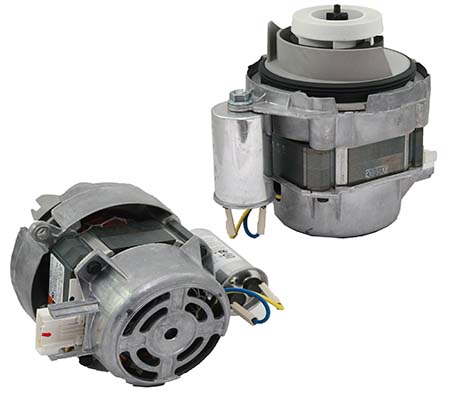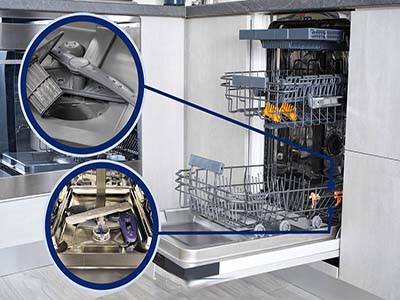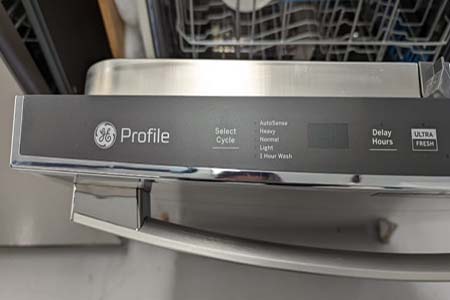Understanding the Annoying Dishwasher Noise
Dishwashers are invaluable kitchen appliances that save you time and effort. However, when they start making strange and unsettling grinding noises, it can be both bothersome and concerning. This article will delve into the causes behind your dishwasher’s grinding noise and provide practical solutions to restore its tranquility.

Common Causes of Dishwasher Grinding Noise
While dishwasher grinding noise can be bothersome, identifying the problem’s root cause is the first step toward a solution. Below, we’ll explore the common signs and symptoms associated with each of these causes:
1. Foreign Objects in the Pump
Signs of the Problem:
- Unusual grinding or rattling noise during the dishwasher’s operation.
- Inconsistent cleaning performance, as foreign objects obstruct water flow.
- Dishes or glassware may show signs of damage or chipping due to contact with foreign objects.
2. Worn Out or Faulty Pump Motor

Signs of the Problem:
- A persistent grinding noise that doesn’t diminish during the dishwasher cycle.
- Reduced water circulation, resulting in poorly cleaned dishes.
- In some cases, error codes on the dishwasher’s control panel may indicate motor-related issues.
3. Issues with the Spray Arm
Signs of the Problem:
- Grinding or scraping noises, especially during the wash cycle.
- Uneven cleaning, with some dishes remaining dirty due to impaired spray arm function.
- Visual inspection may reveal a misaligned or damaged spray arm.

4. Loose or Damaged Impeller Blade
Signs of the Problem:
- Grinding or clicking sounds originating from the dishwasher’s pump area.
- Reduced water pressure and inefficient dishwashing.
- A visual check may uncover a loose or damaged impeller blade.
Understanding these signs can help you pinpoint the specific issue causing the grinding noise in your dishwasher. By correctly identifying the problem, you can proceed with the appropriate troubleshooting and repair steps to restore your dishwasher’s smooth and quiet operation.
Identifying the Type of Noise
During a wash cycle, pay close attention to the noise your dishwasher is making. Differentiate between continuous grinding sounds and intermittent ones. Determine whether the noise is high-pitched or more of a rumbling nature. By recognizing the specific characteristics of the noise, you can gain valuable insights into its origin and type.
Checking for Visible Obstructions
Conduct a preliminary inspection to check for any visible obstructions inside your dishwasher. Look for stray utensils, food scraps, or debris that might be causing the noise.

Running a Test Cycle
Initiating a test cycle can provide a closer examination of the noise issue and help you understand when and where it occurs.
How to Fix Dishwasher Grinding Noise
If you’ve identified that your dishwasher is making a grinding noise, it’s essential to address the issue promptly. Here, we’ll delve into the common causes of dishwasher grinding noise and provide step-by-step solutions to help you restore the tranquility in your kitchen.
1. Removing Foreign Objects
Cause: One of the most prevalent causes of dishwasher grinding noise is foreign objects finding their way into the pump or other components of the dishwasher. These objects can include broken glass, utensils, or food debris.
Solution:
- Disconnect the dishwasher from its power source to ensure safety.
- Carefully inspect the dishwasher’s interior, including the pump area, for any foreign objects.
- Using caution, remove any obstructions you find. Ensure the pump and other components are clear of debris.
- Reconnect the dishwasher to the power source and run a test cycle to check if the noise has been eliminated.
2. Replacing a Worn Out Pump Motor
Cause: Over time, the pump motor in your dishwasher can wear out or develop faults, resulting in grinding noises during operation. This can be due to worn-out bearings or damaged motor components.
Solution:
- Consult your dishwasher’s manual for guidance on accessing and replacing the pump motor.
- Ensure the dishwasher is disconnected from the power supply.
- Follow the manufacturer’s instructions to safely remove and replace the pump motor.
- Reconnect the dishwasher and run a test cycle to confirm that the noise has been resolved.
3. Resolving Spray Arm Problems
Cause: Issues with the spray arm, such as misalignment or damage, can lead to grinding noises as it scrapes against dishes or the dishwasher’s interior.
Solution:
- Examine the spray arm for any signs of misalignment or damage.
- If misaligned, carefully reposition the spray arm to ensure it rotates freely without making contact with dishes or the dishwasher’s interior.
- If the spray arm is damaged beyond repair, consult your dishwasher’s manual for instructions on replacement.
5. Addressing Drain Impeller Issues
Cause: Problems with the drain impeller, responsible for expelling wastewater from the dishwasher, can lead to grinding noises, particularly during the drainage phase.
Solution:
- Diagnose and address any issues with the drain impeller. This may involve removing blockages or replacing damaged components.
- Consult your dishwasher’s manual for specific instructions on accessing and servicing the drain impeller.
By following these step-by-step solutions, you can effectively address the causes of dishwasher grinding noise and enjoy a quieter kitchen once again. Remember to prioritize safety and consult your dishwasher’s manual for model-specific guidance during any repair or replacement procedures.